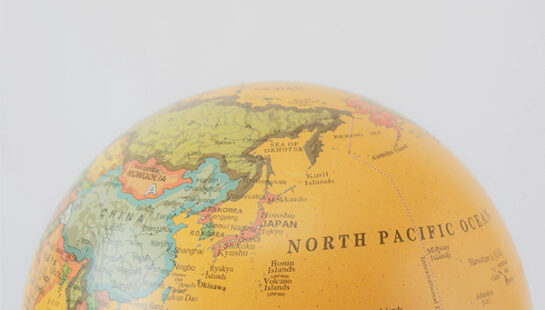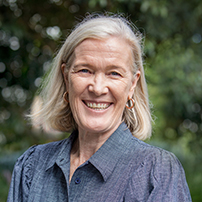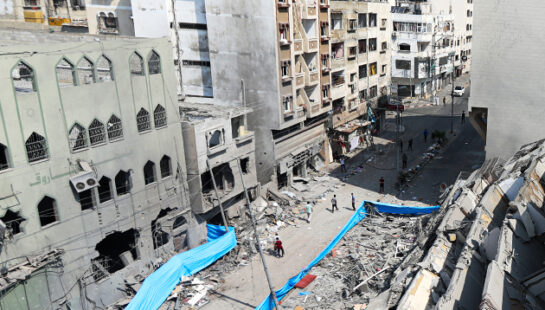At A Glance:
• A polycrisis is when multiple catastrophes interact with each other, creating a bigger impact compared to a single crisis.
• Today’s polycrisis includes conflict in the Middle East and Ukraine, energy shortages, global hunger, the cost-of-living crisis, and the impact of the pandemic.
• Polycrisis affects everyone, but it’s life-threatening for people in poverty. You can help by joining the Safer World for All campaign.
Famine in Africa, conflict in Ukraine and the Middle East, the cost-of-living crisis, natural disasters—if you feel like we live in turbulent times, you’re not the only one.
Experts are describing the collective impact of world events as a polycrisis that’s unlike anything we’ve seen in history. Here’s a quick run-down on what this means, how a polycrisis impacts communities around the world, and what you can do to help.
What Is A Polycrisis?
Polycrisis is when multiple catastrophic events—such as war, famine, or economic collapse—overlap and interact with each other, creating a bigger impact on people compared to one crisis alone.
Analysts have talked about the polycrisis phenomenon since the 1970s, but the word was first widely used by the World Economic Forum in 2023 to capture the scale of the world’s problems today. Some of the interconnected crises we’re currently facing are conflict in the Middle East and Ukraine, energy shortages, global hunger, the cost-of-living crisis, climate change, and the ongoing impact of the pandemic on developing nations.
How Is This Any Different From What’s Happened In The Past?
While it’s true that history is full of events that intersect with each other, what’s unique about today’s society is how interdependent we are.
Globalisation means that a crisis in one system (e.g. a nation’s political climate, a global supply chain, or a region’s ecosystem) impacts communities around the world that rely on that system for their security and prosperity. Take the cost of petrol—over 90 per cent of Australia’s fuel supply is imported, which leaves us vulnerable to high global prices. Or think back to the pandemic, when disrupted global supply chains led to shortages of products like building materials and certain medicines.
For many nations, events aren’t just connected like a line of dominoes; they exacerbate each other so that the end result is far more catastrophic for the population. For example, food insecurity in Africa is caused by lots of different crises: poverty, extreme weather events, the economic impact of the pandemic. Two of Africa’s biggest wheat suppliers are Ukraine and Russia, so when the war in Ukraine began in 2022 and cargo ships no longer had safe passage, the situation in Africa deteriorated into an unprecedented hunger crisis affecting millions of people. This is how polycrisis plays out for many communities around the world.
Does Polycrisis Impact Everyone Equally?
Polycrisis affects everyone, but it’s much more likely to have life-threatening impacts on people living in poverty who have fewer resources to draw on.
Here are some facts to consider:
- People in poverty are most affected by high inflation because food and energy bills make up a bigger proportion of their spending.
- The 74 lowest income countries only emit one-tenth of the world’s greenhouse gases, but they are most affected by the effects of changes to our climate.
- The COVID pandemic stalled progress in ending poverty by three years. Today, around 691 million people live in extreme poverty.
- More than 114 million people have been displaced due to conflicts or human rights violations.
What Can We Do About It?
While the polycrisis is a complex situation with no easy solutions, as Christians, we know that God’s intention is for humans to live in just and peaceful communities, where they can thrive in his good creation.
We also know that decisions made by our generation can help people experience safety, even amidst dangerous weather, increased wars, and soaring inequality.
That’s why we’re part of Safer World for All, a collective call for action from Australian Christians to our nation’s leaders.
Join us in asking our government for:
- Australia’s Foreign Aid budget to be lifted from a record low of 0.19 per cent to 0.37 per cent of Gross National Income by 2027;
- The Humanitarian Emergency Fund to be doubled to $300 million annually;
- An additional $350 million per year to better prepare communities for disasters;
- Support for global efforts to make debt, tax, trade, and investment fairer for developing countries.
It’s easy to feel overwhelmed in the face of worsening catastrophes, but let’s remember that we serve a powerful God who’s at work through his people. Today, we have an opportunity for collective action towards a safer tomorrow.
Join the Safer World for All campaign here, and add your voice to other Australian Christians advocating for justice.



 Melissa Lipsett,
Melissa Lipsett,

 Baptist World Aid
Baptist World Aid